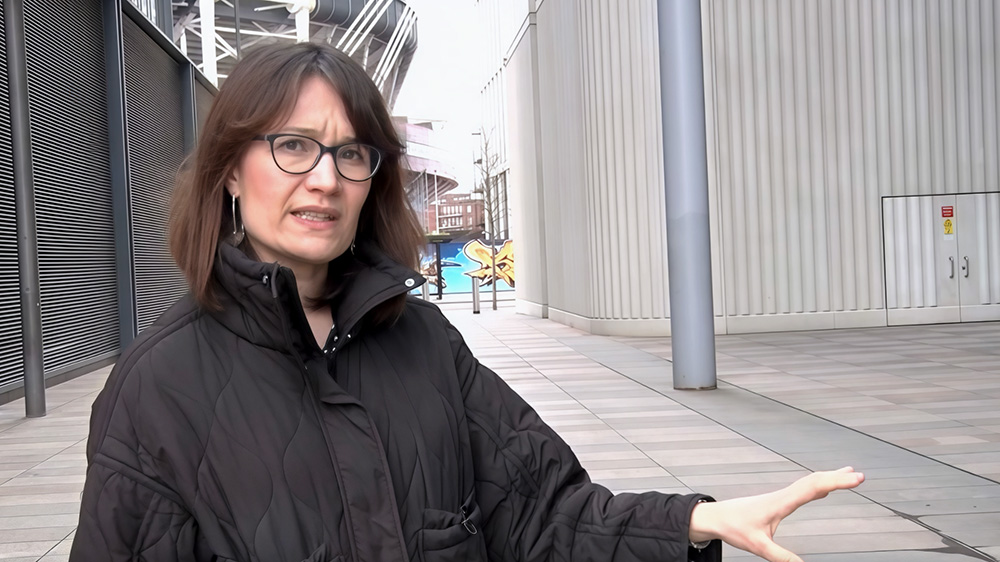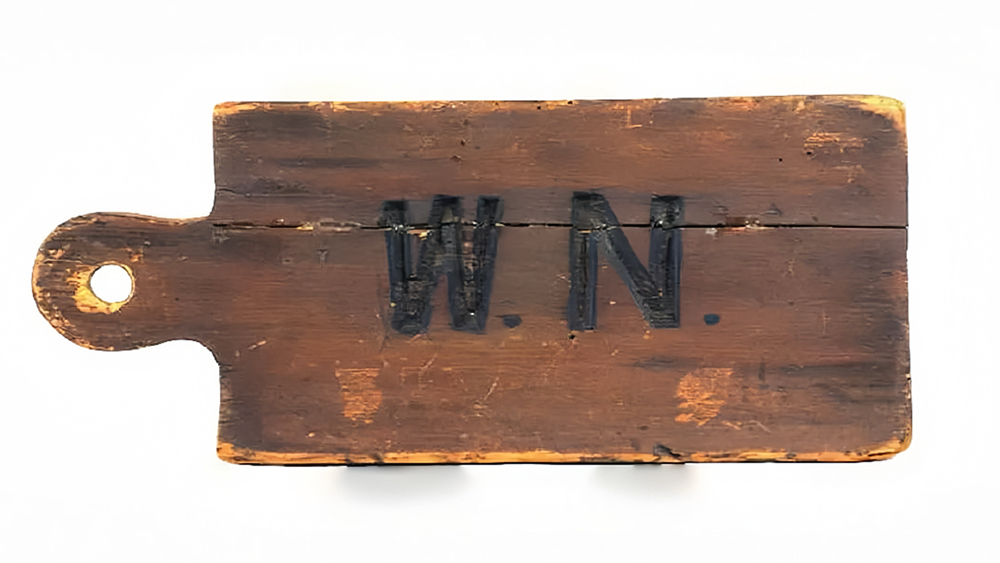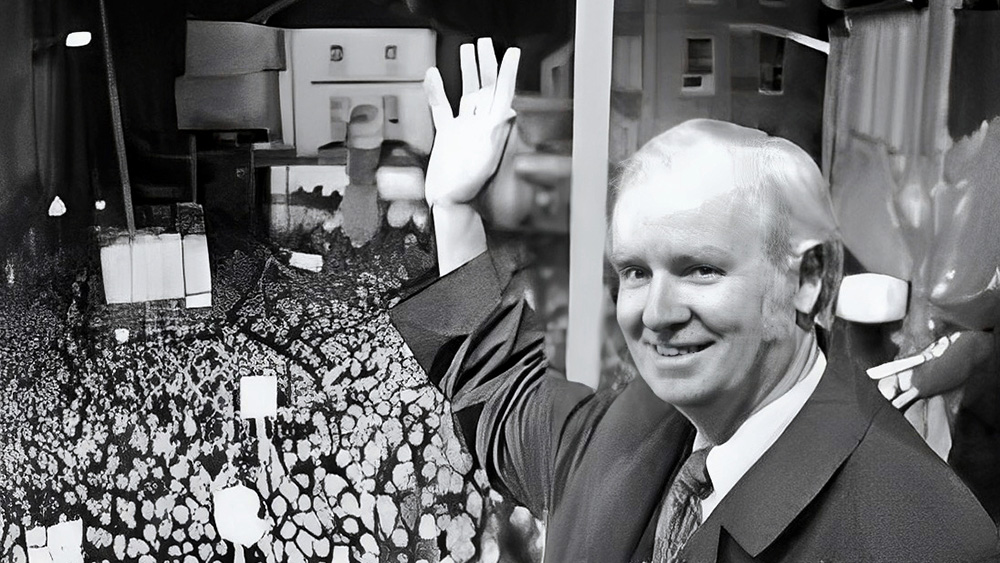The Irish rap group Kneecap proved music can make a minority language cool. Can the Welsh language learn from their playbook and turn up the volume?

Gwenfair Griffith was scrolling through her phone and watching a music video that had gone viral. It was a rap track by the Belfast group Kneecap, performed mainly in the Irish language.
They spitting rapid-fire Irish over pounding hip-hop beats, their lyrics switching seamlessly between English and Irish, mixing ancient Celtic rhythms with modern urban experiences.
“Do you know the band Kneecap?” she says with enthusiasm, turning the screen toward me. “I think we should have a Welsh Kneecap.”
Kneecap is a hip hop trio that comes from the North of Ireland. They are one of the best-known minority language artists in the world today. Many young people who used to hate studying Irish in school are now learning the words to Kneecap songs. For her, the exist of Kneecap is proof that ancient language can thrive in contemporary culture

She is a native Welsh speaker who grew up in Cardiff. For her, the fight for the language’s future is not just an academic subject, but a deeply personal one.
“They have this confidence,” Gwenfair says. “They know they can be successful in their own language without switching to English. That’s the attitude shift we need.”
The parallels between Irish and Welsh run deep. Both Celtic languages survived centuries of suppression. Both were pushed from cities into rural strongholds. Both face the modern challenge of keeping young speakers engaged.
The fight for the Welsh language today is inextricably linked to the centuries-long struggle against its suppression. A significant blow came with the Acts of Union between 1536 and 1543, which made English the sole official language of law and administration in Wales.
Welsh speakers were effectively barred from holding public office under the new laws. This legal marginalisation was followed by a cultural one.
The 1847 Reports of the Commissioners of Inquiry into the State of Education in Wales, known in Wales as the “Treachery of the Blue Books”, blamed the Welsh language for what commissioners saw as Wales’s moral and economic backwardness.
The report’s conclusions had a direct and brutal impact in the classroom. It led to the widespread use of the “Welsh Not,” a wooden placard hung around the necks of children caught speaking their native tongue.
At the end of the day, the child left wearing the placard was often caned. The practice was designed not just to punish, but to humiliate, teaching a generation of Welsh children to associate their own language with pain and shame.
“My parents and grandparents were Welsh speakers,” writes one member of a Welsh-speaking Facebook group. “In the early 50’s, we were told not to speak Welsh in school at all. I found this quite traumatic. So unfair.”

The 20th century brought both new opportunities and new threats. While Welsh-language radio broadcasts began as early as 1923, the arrival of television decades later threatened to accelerate English dominance.
The suppression was not just institutional, but it also became internalised. Generations of Welsh speakers learned to see their language as backward, provincial, something to hide in professional settings. This psychological colonisation proved more damaging than any law. We can still see its downside to this day.
“Welsh people are really polite,” she says. “If somebody comes into a room who doesn’t speak Welsh, they’ll turn to English to help accommodate them. Well, we need to be confident to speak our own language wherever we want, and not be made to feel that we are rude.”
This reflexive code-switching reflects centuries of conditioning. When one language has been legally restricted and socially stigmatized, accommodation becomes a survival strategy. But Gwenfair questions whether this politeness has become counterproductive.
By the 1960s, a new anxiety had taken hold. Many Welsh speakers feared that the flood of English-language television would invade the home, undermining the language in what had been its last stronghold. The fight for a Welsh-language television channel became a defining moment in the nation’s modern history.
Margaret Thatcher’s Conservative government had initially promised to establish a Welsh-language channel in its election manifesto, but reversed that promise after winning the 1979 general election. The U-turn provoked a furious backlash across Wales.
Gwynfor Evans, the respected former president of Plaid Cymru, announced he would fast until death unless the government honoured its broken promise. The threat was too powerful to ignore. Faced with immense public pressure, the government eventually relented.
In 1982, S4C (Sianel Pedwar Cymru) launched. It became the first television channel in the United Kingdom and Europe’s first television channel broadcasting in a minority language.

“There was a big, big campaign from Welsh people who sacrificed a lot to try to ensure that they did get a channel,” Gwenfair says. “It was seen as another way of trying to kill off the language, because language really doesn’t survive without culture.”
And for generations in Wales, the most powerful and resilient form of that culture was song. The celebrated Welsh historian John Davies famously described it as “the miracle of Welsh survival,” and a huge part of that miracle was sung.
In communities where English dominated the public sphere, the language was kept alive not in government halls, but in the harmonies of chapel hymns, the stories of folk songs, and the powerful resonance of working men’s choirs.
Growing up in a Welsh-speaking family, Hannah Williams is continuing that tradition as a member of the student choir Aelwyd y Waun Ddyfal, where they rehearse traditional Welsh harmonies.
“Wales is Gwlad y Gân [the Land of Song]. Any threat to Welsh music is a threat to Welsh identity itself,” Hannah says. “ I think Welsh music is so, so important to Wales.”
But as Wales changed, so did its music. The 20th century brought new sounds. The rise of rock and roll, and later punk, provided a new, rebellious voice for a generation fighting for the language’s future.
This musical tradition evolved but never disappeared. Where chapel hymns once dominated Welsh musical expression, today’s scene is remarkably diverse.
“We have the National Eisteddfod held every year, which brings people from all over the country together to celebrate Welsh music. We also have festivals held more locally, such as Tafwyl here in Cardiff,” Hannah says. “I think things like that are really important just to keep music alive and show how important Welsh music is for us here.”

The Eisteddfod, Wales’s festival of literature, music and performance, has roots in medieval bardic competitions. Today, the National Eisteddfod remains one of Europe’s largest cultural festivals, conducted entirely in Welsh.
Today’s challenges are different, often rooted not in legal suppression, but in the complex social dynamics of a bilingual society. Behind the cultural arguments lies a harsh economic reality.
“People think, ‘Oh, I can go viral if I do it in English,'” Gwenfair says. “Even though they might speak Welsh, they choose to do it in English so that they can reach more people. And that has consequences for the Welsh language.”
These consequences are amplified by the very design of social media. Their algorithms are built to favour content with the broadest possible appeal, systematically pushing English-language trends to global users while minority-language posts struggle for visibility.
Each Welsh speaker who switches to English for content creation represents one less voice maintaining the language’s digital presence.
Additionally, Young Welsh speakers often leave Wales for better opportunities elsewhere, creating a brain drain that affects not just the economy but the daily use of Welsh in communities.
According to recent research by Observatory Wales, approximately 8,000 young people in the Arfor [a joint economic venture between the Welsh counties of Anglesey, Gwynedd, Ceredigion, and Carmarthenshire] region who are very likely to be Welsh speakers left Welsh-speaking heartlands annually in 2017-2018. Job opportunities are one of the significant factors that influence the choice of young people.
“We need better jobs in Wales to keep people here,” Gwenfair says. “People need to be able to have more jobs where they can speak Welsh, people be able to speak more Welsh in every part of their life, that’s going to be helpful.”
These are not just numbers but represent voices and cultural continuity draining away from communities that have kept Welsh alive for generations. Although education remains central to Wales’ future, the system faces significant challenges.
“I think that children should be allowed to learn Welsh when they go to school. Every child should be learning Welsh in school,” Gwenfair says. “But that’s really hard because there’s a big problem with the number of teachers.”
Without enough Welsh-medium education, fewer young people become fluent enough to teach, which limits the expansion of Welsh-medium education.
Breaking this cycle requires not just policy changes but cultural shifts in how Welsh is valued and perceived.
“That’s one thing I would like for Welsh people to have the confidence to know that we’re good enough speaking our own language,“ Gwenfair says. ” We don’t need to turn to English to be successful. We can be successful as Welsh speakers.”
The Welsh language has survived for nearly two millennia, adapting to each new challenge. From the oral traditions of ancient bards to the digital platforms of today, Welsh has proven remarkably resilient.
Proportion and number of Welsh speakers across Wales
“We’ve got a thriving Welsh music scene,” Gwenfair says with a grin. “We make great programmes on television and radio. We’ve got great actors who speak Welsh.”
Martha Owen, a musician and co-founder of the gig-mapping website Amni, sees this as the unique power of the music scene. She argues that while schools can teach a language, they can rarely make it a vibrant part of youth culture.
She believes the success of the Irish rap group Kneecap proves that language is not a barrier to enjoying music. A non-Welsh speaker can feel the energy of a Welsh punk band or the melancholy of a traditional ballad without understanding a single word.
“You don’t have to speak Welsh to be able to enjoy Welsh language music,” Martha says. “People like Kneecap and other groups that sing in their own languages and not English have shown that you don’t have to understand the lyrics to be able to enjoy it.”
While formal education is crucial for teaching the Welsh language, many argue that the classroom alone cannot ignite the passion required for its daily use. Music can also succeed where official policy might fail.
“I remember coming across Kneecap last year, I think that’s so cool, it’s something that policies in school can’t do,” she says. “ because you push a minority language as a school subject and it’ll never quite become something ‘cool’ that young people will want to use.”
In Gwlad y Gân[the Land of Song], the music will always continue. From university choir groups to music studios, from traditional Eisteddfod stages to underground gig venues, Welsh is finding new voices for a new generation.
The Welsh have lived through the Acts of Union, the Welsh Not and the digital revolution. Their song has been playing for 2,000 years and shows no signs of stopping. The question is not whether Welsh will survive anymore as it has proven its resilience through time.
The question is whether this generation will be the one to claim their space, innovate, and even influence mainstream culture with the confidence of those Belfast rappers in balaclavas.
If the trios from Belfast can make the world listen to Irish hip-hop, then perhaps Welsh is ready to turn up the volume too.
Gwenfair puts her phone away, and the Kneecap video is still echoing. The success of Kneecap provides a powerful and contemporary template for capturing the world’s attention. But a more pressing question is on the horizon for her.
How does a culture move beyond a single viral moment to ensure the language’s revival is a lasting one? She believes the key is the attitude of Welsh speakers.
There’s something distinctly Welsh about embracing the struggle. We are proud of being underdogs who are always fighting,“ Gwenfair says. “And we’ll just keep on fighting, and we’ll keep on being the underdogs. But we just have to keep surviving.”
